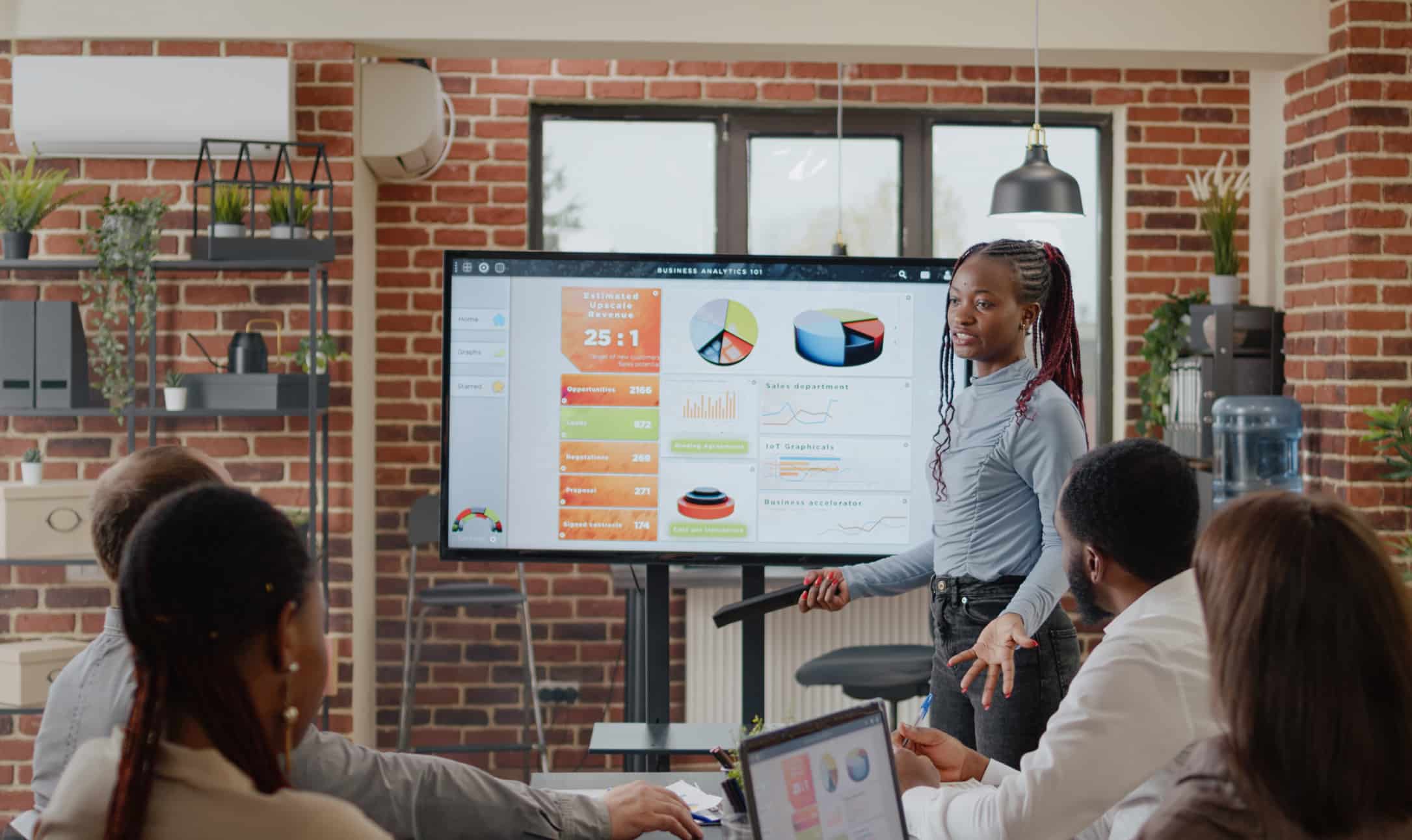You know us: we love talking about employee performance reviews and discussing ways to improve performance management. And sometimes, you must go back to the basics to brush up on the fundamentals and ensure that your evaluations are a company asset, not a drawback. This post highlights all the key points you need to address in your employee performance reviews, with valuable tips from managers to help you!
1) Performance Insights and Areas to Work on
Before the performance review, it is crucial to collect performance data and identify productivity issues. Key Performance Indicators and daily meetings are ways to notice drops in performance that you will address during employee performance evaluations.
The evaluated employee needs to think about their own performance and how they could improve it. Performance reviews are great moments to identify how management practices could be optimized to support productivity. Indeed, managers also need to hear their team’s perspective on daily practices and issues that might hinder performance.
As you can see, performance appraisals are two-way conversations and require great honesty and flexibility. This type of quality is the second key point to address during performance appraisals!
2) Soft Skills
Technical skills are not the only focus of a comprehensive performance review. Indeed, soft skills are the backbone of employee performance and good team productivity.
Here are examples of soft skills you need to comment on during the interview, whether they are already mastered or need improvement:
- Teamwork: Is your employee a good team player? Are they easy to work with? Highlight the benefits of collaboration and think about ways to improve team spirit throughout your discussion with the employee.
- Flexibility: While performing tasks according to a determined schedule is good, being able to perform under changing circumstances is great! A flexible employee is ready to take on new challenges, learn new skills and use various tools.
- Communication: Do you feel like you have a good manager-employee relationship with the evaluated worker? Can your communication be improved? It’s important to encourage your employee to voice their concerns and issues before they get out of hand and to reach out when they need help.
- Problem-solving skills: How does the employee react when faced with new challenges? Are they able to solve problems on their own? While teamwork and communication are crucial, autonomy is an essential soft skill.
No matter which soft skill you are evaluating, make sure you provide constructive feedback, and take some time to focus on the positive. Or you can go even further by using 360-degree feedback during your reviews.
Psst… Click here if you need effective performance review phrases examples!
3) Recognition and Achievements
Although discussing productivity challenges is paramount, accolades and employee recognition are just as important. Small accomplishments and big successes need to be highlighted, and gratitude should always be expressed during and outside performance evaluations. Remember to convey your appreciation for daily efforts and highlight your employees’ role in your company’s success. It’s no sweat off your back, but it means a lot to your employees.
You can also reflect on employees’ successes and encourage them to maintain productive behaviors and keep up the excellent work.
Encouragement is essential to helping employees improve their performance. During a performance review, provide positive feedback and specific examples of what the employee has done well.
You might also want to suggest areas for improvement and provide guidance on how the employee can work to get better in those areas.
Finally, be sure to express your confidence in the employee’s ability to improve and make continued progress. You can help your employees become even more successful performers by providing encouragement and clear direction. – Nuria Requena, Talent Acquisition Manager at Spacelift
4) Company Values and Mission
Annual performance appraisals are the perfect time to discuss corporate values and organizational goals for the year to come. By addressing this critical point, you’ll ensure that all your teams are on the same page regarding values to maintain and objectives to reach.
It also never hurts to remind the employee of their position (how important it is, how it contributes to the company’s mission, and how it can evolve in the future) and ask them how they envision their future in the company.
5) Training and Professional Development
It’s all well and good to point out performance issues, but a good manager should begin the performance review with clear solutions in mind. In addition, performance management is meant to foster growth and development. For these two reasons, discussing training and development opportunitieswith your employees during the performance interview is essential.
Are your employees adequately trained? Do they feel like they are growing professionally and learning new things? Ask them what they think, and you will obtain great avenues for improvement while increasing employee motivation.
Ask your employees about their training expectations and increase their motivation with Folks Surveys’ solutions!
6) Motivation and Expectations
Remember that the employee needs to be involved in all aspects of the performance evaluation process! This means that all the previous key points need to be addressed both through the manager’s and the employee’s eyes.
That is particularly true when it comes to discussions on motivation and expectations. Essential questions to ask the employee during a performance review are as follows:
- Do you feel motivated when you come to work everyday?
- What are your expectations in terms of career development and new opportunities?
- What are your salary/raises expectations for the near future?
- Do you feel like you have a future within the company?
These engagement questions ensure that you conduct meaningful discussions while noticing potential drops in motivation.
7) Future Goals and Workplace Improvement
Your performance appraisal should not focus on the past, but strive to build a better future for the employee. In that sense, it is essential to define future performance and employee goals, both in the short and long term. You need to mention career development opportunities but also reflect on how the workplace could be improved to better suit your employees’ needs and expectations.
Encourage employees to set up their own goals before the performance review meeting and make sure that a good chunk of the employee review is dedicated to future endeavors. Furthermore, transparent discussions on the future are drivers of motivation and engagement, and might help you increase employee retention.
8) Next Performance Meetings and Ongoing Support
Speaking of future opportunities, remember to conclude your performance evaluation by scheduling the next performance meeting and reminding your employee that they can reach out to you whenever they need support.
When conducting performance reviews, I always address vital points such as teamwork, communication skills, and flexibility. These are important in any work setting because they show an individual’s ability to work well with others and adapt to changes in the workplace.
For example, working well as a team is critical for resolving conflicts and achieving company goals. Communicating effectively helps ensure that work tasks are completed accurately and efficiently. And they are having flexibility in one’s skillset allows the employee to take on new responsibilities and adapt to new challenges.
I believe the essential part of any performance review is addressing areas for improvement and setting clear, achievable goals for the future. Employees can constructively focus on self-improvement by providing specific examples and actionable steps. Additionally, it is essential to encourage this growth by offering support and resources such as mentorship or training opportunities.
Finally, it is crucial to regularly schedule check-ins with the employee to track their progress and provide continuous feedback. It allows for mutual accountability and enhances the overall success of the performance review process. – Sarah Watson, Psychologist and COO at BPTLAB
Performance management is an everyday business, and ongoing support should be provided to your teams. If you feel like you should set up more frequent performance reviews or change your evaluation methods, do so and update your employees on the new process. Modernizing your practices with performance management software is the best way to optimize your company culture and provide frequent feedback.
Addressing all these key points during a performance review will help ensure your employee’s growth and success. If you want to go further, why not prepare for your employee performance appraisal so that you are ready to conduct swift and efficient evaluations at the end of the year?
Do you want to improve your performance review process?
Discover all the tips you need to conduct effective reviews:
DOWNLOAD YOUR FREE PERFORMANCE REVIEW EBOOK










